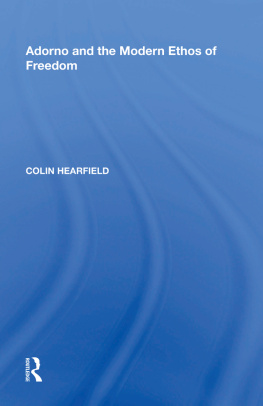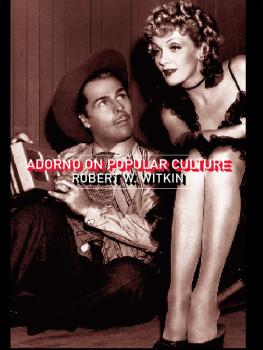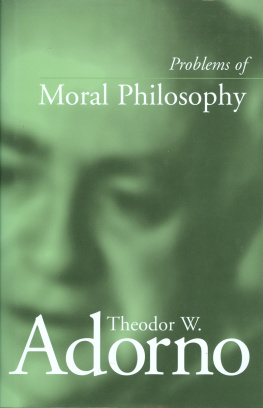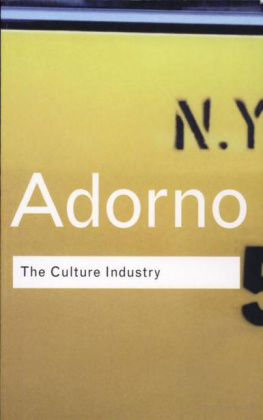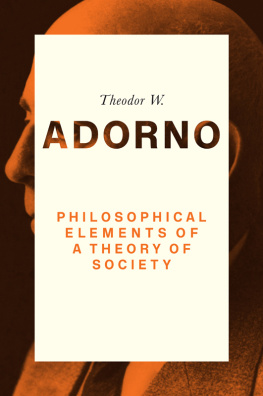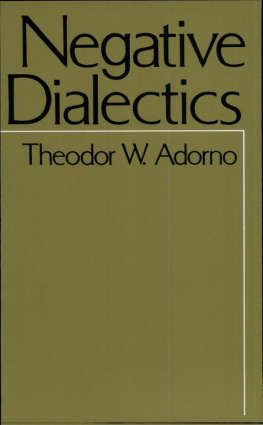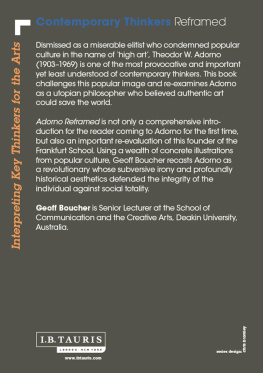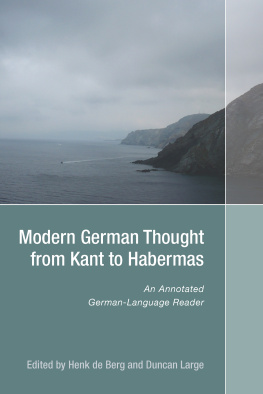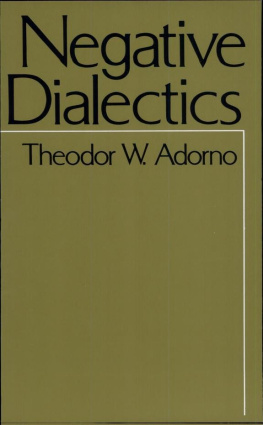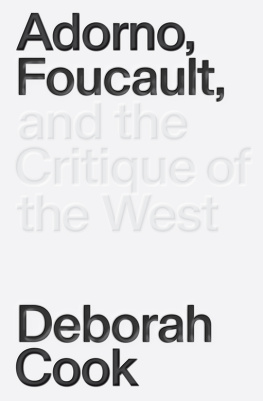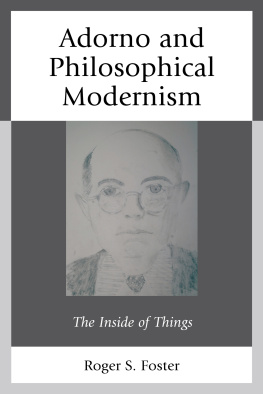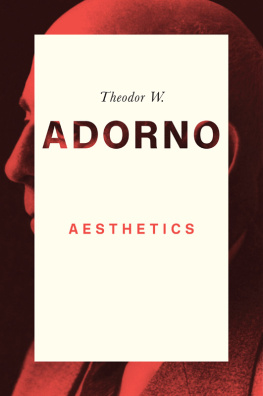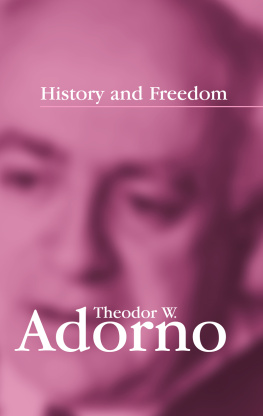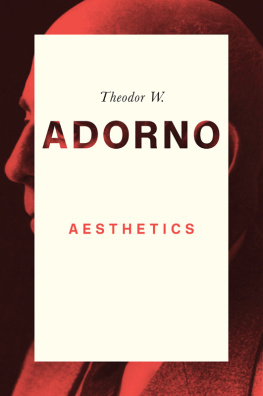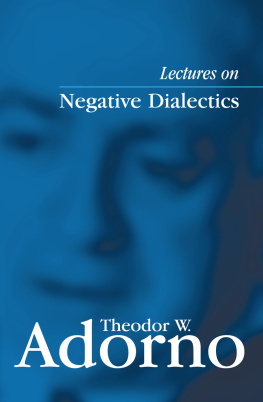Adorno and the Modern Ethos of Freedom
Delivering a concise and lucid account of Adorno's response to the modern question of freedom, Hearfield sets into critical relief six other modern philosophies of freedom from Kant, Hegel, Nietzsche, Heidegger, Foucault and Habermas. The book presents a broad variety of perspectives concerning the question of freedom, and draws out the contrasting and superior merit of Adorno's response.
Hearfield employs an interpretive framework that makes a distinction between a conceptual ratio (Kant, Hegel and Habermas) and an existential poiesis (Nietzsche, Heidegger and Foucault). The book includes singular reconstructions of Adorno's immanent critiques of Kant, Hegel, Nietzsche and Heidegger, and demonstrates the theoretical instabilities peculiar to Foucault and Habermas. The book concludes by revealing the respective 'blind spots' in the conceptual ratio and existential poiesis modes of thinking, which block our capacity for becoming free.
Ashgate New Critical Thinking in Philosophy
The Ashgate New Critical Thinking in Philosophy series aims to bring high quality research monograph publishing back into focus for authors, the international library market, and student, academic and research readers. Headed by an international editorial advisory board of acclaimed scholars from across the philosophical spectrum, this new monograph series presents cutting-edge research from established as well as exciting new authors in the field; spans the breadth of philosophy and related disciplinary and interdisciplinary perspectives; and takes contemporary philosophical research into new directions and debate.
Series Editorial Board:
David Cooper, University of Durham, UK
Peter Lipton, University of Cambridge, UK
Sean Savers, University of Kent at Canterbury, UK
Simon Critchley, University of Essex, UK
Simon Glendinning, University of Reading, UK
Paul Helm, King's College London, UK
David Lamb, University of Birmingham, UK
John Post, Vanderbilt University, Nashville, USA
Alan Goldman, University of Miami, Florida, USA
Joseph Friggieri, University of Malta, Malta
Graham Priest, University of Melbourne, Australia
Moira Gatens, University of Sydney, Australia
Alan Musgrave, University of Otago, New Zealand
Adorno and the Modern Ethos of Freedom
Colin Hearfield
University of New England, Australia
First published 2004 by Ashgate Publishing
Reissued 2018 by Routledge
2 Park Square, Milton Park, Abingdon, Oxon OX14 4RN
711 Third Avenue, New York, NY 10017, USA
Routledge is an imprint of the Taylor & Francis Group, an informa business
Colin Hearfield 2004
Colin Hearfield has asserted his moral right under the Copyright, Designs and Patents Act, 1988, to be identified as the author of this work.
All rights reserved. No part of this book may be reprinted or reproduced or utilised in any form or by any electronic, mechanical, or other means, now known or hereafter invented, including photocopying and recording, or in any information storage or retrieval system, without permission in writing from the publishers.
A Library of Congress record exists under LC control number: 2004006144
Notice:
Product or corporate names may be trademarks or registered trademarks, and are used only for identification and explanation without intent to infringe.
Publisher's Note
The publisher has gone to great lengths to ensure the quality of this reprint but points out that some imperfections in the original copies may be apparent.
Disclaimer
The publisher has made every effort to trace copyright holders and welcomes correspondence from those they have been unable to contact.
ISBN 13: 978-0-815-38745-9 (hbk)
ISBN 13: 978-1-351-16340-8 (ebk)
to Alec,
with love and hope for a better world
Contents
Guide
In particular I would like to acknowledge the helpful and stimulating discussions offered by William McDonald throughout the course of this writing. His invaluable friendship made it possible to pursue this project to completion. For their intellectual and personal support, I am very grateful to Kate Lawson, Tony Lynch, and Fred D'Agostino. I would also like to thank Alan Helmridge, who first generated my interest in dialectical critique through selected readings from Hegel's Science of Logic. To my mother and father I am deeply indebted for their patience and understanding.
Earlier claims to be modern, during the fifth, twelve, and seventeenth centuries, were articulated through the renewed ethos of an idealized past - respectively, early Christianity, ancient Greece and Rome. From a philosophical perspective, the emergence of the modern ethos of freedom is marked by a critique of rationalist metaphysics and its theistically grounded claim to moral truth. With the dismissal of any transcendent, heteronomous moral authority, modern philosophy confronts the task of articulating a practical reason adequate to the new ethos of freedom.
Early modern conceptions of the relatien between practical reason and action reveal that relation as profoundly contradictory. Evidence of this may be found in seventeenth-century literature some decades prior to the philosophical writings of Descartes. Shakespeare's 'Hamlet', for example, 'is as much the proto-history of the individual in its subjective reflection as it is the drama of the individual paralyzed into inaction by that reflection'.impulsive drive to action, the outcome of which, at least for the reader, is always fraught with failure. Both Hamlet and Don Quixote thereby demonstrate an early modern awareness of the difficult yet inextricable link between theory and practice. Moreover, when either assumes primacy over the other, that primacy reveals the violence of an indiscriminate power. Against both alternatives, Adorno delineates a third mode of understanding the relation between theory and practice.
A consciousness of theory and praxis must be produced that neither divides the two such that theory becomes powerless and praxis becomes arbitrary, nor refracts theory through the archbourgeois primacy of practical reason proclaimed by Kant and Fichte. Thinking is a doing, theory a form of praxis; already the ideology of the purity of thinking deceives about this. Thinking has a double character: it is immanently determined and rigorous, and yet an inalienably real mode of behaviour in the midst of reality. To the extent that subject, the thinking substance of philosophers, is object, to the extent that it falls within object, subject is already also practical. The irrationality of praxis that continually resurfaces however - its aesthetic archetype are the sudden random actions by which Hamlet carries out his plan and in carrying it out fails - unceasingly animates the illusion of the absolute division between subject and object. Where subject is inveigled into believing that object is something absolutely incommensurable, the communication between the two becomes the prey of blind fate.
Adorno here outlines a dialectical relation of theory and practice where each mediates or determines the other through becoming that other, albeit in a distinctly transfigured fashion. Each is at once the other and yet distinct from it.
Adorno's understanding of this dialectical relation between theory and practice is perhaps best set in relief by elucidating Horkheimer's crucial distinction between traditional and critical theory.nor fully reducible to its own conceptual apparatus. Rather critical theory perceives itself as both a determining and determined aspect of those social relations.

